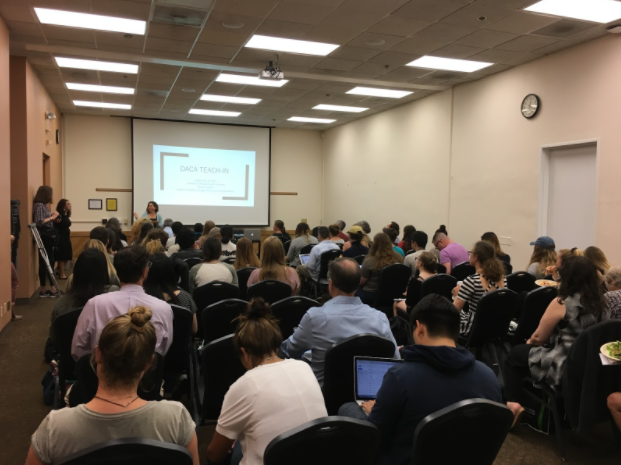DACA teach-in, held in the UMass Amherst Campus Center on Sept. 20, 2017. (Michael Connors/Amherst Wire)
Local leaders hold DACA teach-in
September 20, 2017
AMHERST— Immigration experts, local leaders and professors came together at the University of Massachusetts on Tuesday night to contribute in a public discussion of immigration policy and the recent termination of Deferred Action for Childhood Arrivals (DACA).
Recently, President Trump’s administration announced plans to end DACA in six months unless Congress either legalized or found an alternative to the policy.
Rebecca Hamlin, a legal studies professor at UMass, began the teach-in with an overview of DACA and its effects on undocumented immigrants in the United States.
Originally established by the Obama administration in 2012, DACA required an initial recipient to have come to the United States under the age of 15 before 2007 and under 31 in 2007.
“It does not put anyone on the path of citizenship, it is not amnesty. It’s basically a very temporary protection with the idea that Congress should be working in the meantime,” she said.
Since its implementation in 2012, DACA has protected around 800,000 young unauthorized immigrants from deportation, Hamlin explained.
Luis Marentes, a professor of Spanish and Portuguese studies at UMass, commented that a major aspect of the public discussion around DACA and immigration reform is the debate between political ideologies on citizenship.
Although many Republican leaders in the federal government support changing DACA, Marentes said that there was still much Democrats in the Massachusetts state legislature could do to help assist undocumented immigrants who have hopes of eventual citizenship.
However, immigration policy in the United States does not only affect DACA recipients, but any immigrant, undocumented or otherwise.
As an undocumented immigrant who missed the DACA cutoff by a few months, Mount Holyoke College student Eduardo Samaniego spoke on the difficulties of living in Mexico and immigrating to Georgia at the age of 16.
“I grew up with this idea that the United States was this country of freedom and liberty where everything in your dreams could come true, and that’s why I wanted to come here,” he explained.
Samaniego worked to be successful in America, becoming first in his class in high school and student body president, only to sadly discover that he could not apply for college due to his citizenship status.
“Nobody really wants to leave their family, nobody wants to leave their job, nobody wants to leave their friends and say goodbye to everything they’ve known for their entire lives.” he said. “We are forced to come here. We are displaced people.”
After high school, Samaniego became more involved in activism for immigration policy reform, taking trips to Washington D.C. and organizing calls to congresspeople. He was eventually awarded a full scholarship for undocumented immigrants to Mount Holyoke.
Now, Samaniego is advocating for a new and broader Development, Relief, and Education for Alien Minors (DREAM) act to pass Congress, which would help young immigrants on a path to permanent residency.
The new DREAM act would stop the removal proceedings of immigrant minors who are enrolled in elementary or high school, and make it easier for immigrant college students to access college loans.
“We shouldn’t just be basing this legislation on their good grades or their ability to contribute to our economy, but rather under their humanity and their human rights as a whole,” Samaniego said.
Next, Dan Berger, an immigration attorney, and Bill Newman, director of the American Civil Liberties Union (ACLU) of Western Massachusetts, commented on their experience working with immigrants. They both suggested that if DACA is terminated, there will be an increased need for legal support among immigrants.
The conversation quickly turned into a discussion of resources on campus and in the community for those who may be affected by the recent immigration policy development.
Angelica Bernal, UMass political science professor; Kevin Young, UMass history professor; and Pamela Dutta, assistant director of the UMass Student Legal Services Office (SLSO) each reiterated the importance of confidential campus resources like the SLSO.
“The university does not keep a list of any DACA students at all, and all matters discussed with the Student Legal Services are kept confidential, and I will also hold by the same principles” said Bernal.
The SLSO provides legal services to all fee-paying UMass students without additional charge.
Young touched on the Pioneer Valley Workers Center, and the work the center does to help protect undocumented people in the community.
With a volunteer network of over 1,800 people, the Pioneer Valley Workers Center is able to quickly mobilize its activists to assist undocumented community members in instances of immigration officials appearing.
Email Michael at [email protected].
